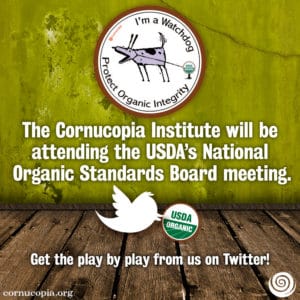 Last Updated: 4-30-15, 3:22 p.m. PT
Last Updated: 4-30-15, 3:22 p.m. PT
Join The Cornucopia Institute as we live tweet from the National Organic Standards Board meeting in La Jolla, California. We will be sharing the play by play with our Twitter followers under #NOSB or simply follow our stream.
If you’re not already following us on Twitter, please do so here.
Read The Cornucopia Institute’s written comments to the NOSB here.
You can also stay updated throughout the meeting right here:
Thursday, April 30, 2015
3:22 p.m. PT: Livestock subcommittee concludes its review of 2017 sunset materials. Full board now looking at subcommittee workplans, prior to some ceremonies before adjournment.
2:45 p.m. PT: NOSB back in action after a short lunch. They have turned their attention to the 2017 list of sunset materials – a total of 40 they they are reviewing. The 4 day meeting is set to end late this afternoon.
12:43 p.m. PT: Carmela Beck states there are no alternatives currently and we need to act now, while Nick, Calvin, Francis and Colehour prefer to send it back to subcommittee to propose holistic rulemaking. The vote to average synthetic methionine over the lifespan of the bird passes 10-4 with Nick Maravell abstaining in objection to the ability of Harold to vote from Skype. Harold’s vote allows the motion to pass. A resolution that the NOSB is committed to the phase out of methionine passes quickly after.
12:19 p.m. PT: Board moves to vote on the methionine proposal before it. Nick Maravell announces he is uncomfortable with the process of bringing in an absent member and withdraws from the vote. The board adopts the proposal by a 10-4 vote. It only passed with the questionable insertion of an absent member by Skype allowing him to vote.
12:12 p.m. PT: NOSB debate continues on proposal to change methionine usage in poultry, much of the discussion is complicated by procedural matters. Board member Francis Thicke describes the current approach to methionine as input substitution for better practices. Indicates that there is little motivation by the industry to change practices. Board member Calvin Walker notes that Europe is using different breeds to address methionine issues. To understand more on this issue, check out Cornucopia’s comments.
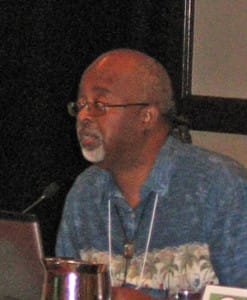 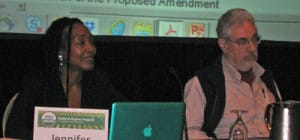 |
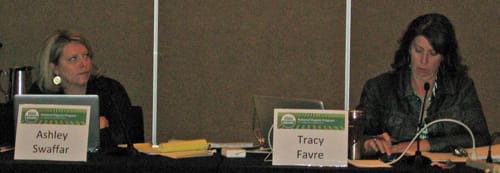 |
12:11 p.m. PT: Colehour Bondera argues that the subcommittee never discussed an expiration date. Zea Sonnabend states this is a multidimensional problem and it requires a whole system approach. A task force is needed but in the end this is an urgent animal welfare matter.
11:48 a.m. PT: Mac Stone states we need to take a holistic view of this and come back with a consensus. Nick Maravell states that management and cultural practices, such as breed selection can be changed to prevent the need for synthetic methionine. We need to look at other alternatives, including an omnivore diet, back in subcommittee. Calvin Walker recalls that we’ve tried expiration dates on this issue in the past and it hasn’t worked to reduce the reliance on synthetic methionine.
11:38 a.m. PT: Long debate on synthetic methionine vote ensues. Calvin Walker’s well articulated argument to respect past NOSB votes and consumer’s desire for an expiration date is cut short by Tracy Favre. Mac Stone wonders whether we should allow retail concerns over maintaining a vegetarian diet in a naturally omnivorous animal should impact policy.
11:25 a.m. PT: Objection over Harold Austin’s right to vote via Skype from the hospital includes the reading of Robert’s Law by Colehour Bondera which states “The right to vote is limited to members that are actually present at the meeting.” Objections overruled by Jean Richardson who, in a written prepared statement, acknowledges Harold’s attendance at the meeting via Skype and allows him to participate. Harold fell and broke his hip two days ago at the meeting. Some view his vote at this meeting as essential to getting their positions passed.
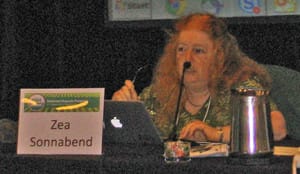 |
10:25 a.m. PT: Near the end of the seed panel contamination discussion, NOSB member Zea Sonnebend calls for continued GMO labeling efforts and litigation to keep pressure on the promoters of GMO food and crops.
9:57 a.m. PT: Last presenter on the panel notes, if we start with pure seed (no contamination), gmo free food can be grown (he was specifically talking about corn).
9:54 a.m. PT: NOSB members Calvin Walker, Francis Thicke and Mac Stone listen to deliberations at the NOSB meeting, below.
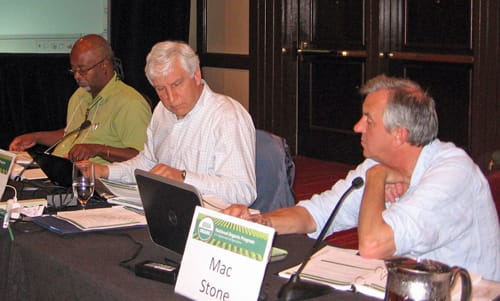
9:45 a.m. PT: Unanimous agreement from the 4 members of the Seed Purity Panel that GMO contamination likely can’t be prevented. Discussing “Coexistence” may appease some in the Organic community. Are there sure answers outside of a ban on GMO production to keep GMOs out of Organics?
9:20 a.m. PT: 2nd panel presenter notes than new genetically engineered techniques are coming online that may not require federal regulation and/or a very difficult to detect. This will further threaten organic seed production and integrity.
8:53 a.m. PT: There is a problem with antitrust and seed, notes the first of four seed contamination panel members, as the NOSB resumes discussion on the last day of its meeting in LaJolla. The speaker was referencing the incredible consolidation of the seed industry, with Monsanto, Syngenta, and others buying up many, many seed companies and shrinking the availability of seed varieities. This is a real problem for organic farmers and consumers.
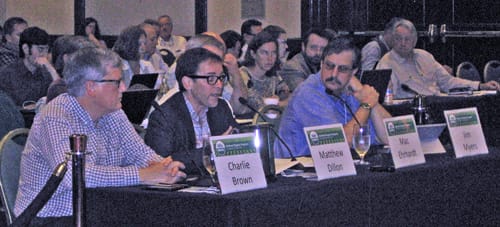 Seed Contamination Panel
Seed Contamination Panel
Wednesday, April 29, 2015
4:37 p.m. PT: As the afternoon wears on, two NOSB members ask “Did I put you all to sleep” as the board offers little reaction to presentations on the various materials. It’s an indication of the overwhelming technical analysis task this 15 member volunteer board faces.
4:06 p.m. PT: NOSB members make very few comments on crops materials.
3:17 p.m. PT: The crops subcommittee has moved onto a discussion of 40 materials that are on the 2017 Sunset schedule. The remainder of the afternoon meeting is devoted to this overarching discussion.
3:11 p.m. PT: The motion to remove Hydrogen Chloride for use as a cotton seed delinter for mechanical planting fails, closing the door for starch-coated organic cottonseed opportunities.
3:01 p.m. PT: Earthworms (the symbol of healthy organic soil) beware! 2016 Sunset material Ferric phosphate (formulated with the earthworm killing chelating agent EDTA) is voted to remain on the NL.
2:45 p.m. PT: NOSB considers contamination of farm inputs discussion document stressing that this is the perfect example of how the NOSB would like the opportunity for a continuous open docket to hear from the organic community between meetings.
2:42 p.m. PT: Board members continue to wrestle with how to allow public comments between meetings to help their deliberations on materials and issues. The board has discussed an open docket. NOP Director McEvoy indicates that they have been looking at this for three years. He adds that to focus on it now would keep resources away from other issues, like animal welfare.
2:30 p.m. PT: NOSB vote 14-0 to reject all 3 petitioned materials – Calcium sulfate (FGD synthetic), exhaust gas and 3-decen-2-one — for addition to National list.
12:38 p.m. PT: Board breaking for lunch, Handling Subcommittee has completed their first review of 2017 Sunset materials.
9:16 a.m. PT: The first half of the NOSB’s morning is devoted to discussion of handling substances scheduled for Sunset in 2017. They have set aside 2 hours for discussion of 104 materials – or about a minute per substance. No votes will occur on these today, that will occur this fall.
Tuesday, April 28, 2015
6:39 p.m. PT: Sodium acid pyrophosphate and for use only as a leavening agent is voted to remain on the NL due to the fact that health concerns were raised only at this meeting, which are considered untimely.
Tetrasodium pyrophosphate for use only in meat analog products is voted to be removed from the NL based on availability of non-synthetic alternative protein sources.
6:24 p.m. PT: 2016 Sunset of boiler materials cyclohexylamine, diethylaminoethanol, and octadecylamine are voted to be removed from the National List due to their toxic nature on humans and the environment. The petition to add PGME as a boiler steam additive for use in feed pellet mills is denied based on the fact that PGME DOES come into contact with food, a concern that Cornucopia brought to the NOSB for consideration a year ago.
6:15 p.m. PT: Motion to remove 2016 sunset handling material Peracetic acid for use in wash and/or rinse water according to FDA limitations for use as a sanitizer on food contact surfaces fails. Peracetic acid remains on the National List.
6:10 p.m. PT: Motion to remove 2016 sunset material Activated Charcoal only from vegetative sources; for use only as a filtering aid on 205.605(b) fails, it remains on the National List.
6:06 p.m. PT: Motion to remove Microorganisms from 205.605(a) fails (living organisms such as bacteria and fungi), but the issue of bacteriophage will be referred back to subcommittee).
5:58 p.m. PT: L-Malic acid: Board votes 12 to 2 to keep L-Malic acid on the National List.
5:46 p.m. PT: 2016 sunset material Eggwhite Lysozyme used in wine and cheese making is voted to be removed from the National List. Eggwhite Lysozyme is a purified enzyme preparation extracted from chicken egg whites using an inert polymer resin.
5:31 p.m. PT: Ancillary substances permitted in microorganisms are voted to be sent back to the subcommittee for further work. Ancillary substances are intentionally added to formulated generic handling substances (but do not have a technical or functional effect in the finished product) and are not considered part of the manufacturing process that has been reviewed by the NOSB.
5:15 p.m. PT: Triethyl citrate petitioned for use as a whipping enhancer for egg whites is unanimously voted to not be listed at 205.605 due to lack of essentiality
5:02 p.m. PT: First two votes by the NOSB are unanimous.
Agricultural glycerin is added to 205.606 limiting non-organic glycerin to be used only when organic glycerin is commercially unavailable.
Whole algal flour manufactured with algae by fermentation and used as a food additive is voted to not be added to 205.605a based on concerns over redacted information in the petition.
4:18 p.m. PT: Marty Mesh of Florida Organic Growers closes out public testimony, promoting organics as a way to heal the planet.
4:10 p.m. PT: Derek Casady, co-manager of the Ocean Beach Food Co-op in the San Diego area, presents testimony on a variety of handling materials coming before the NOSB. He is a Cornucopia member and volunteer citizen lobbyist.
4:02 p.m. PT: Mohamed Mousa testifies for the continued need to provide synthetic methionine. Mohamed passes himself off as a concerned citizen interested in animal welfare (a legitimate concern). In reality, he represents the massive Michigan-based egg producer (see photo here: https://www.cornucopia.org/organic-factory-farm-investigation/photo-gallery-green-meadow/), with 85,000 birds per building.
3:41 p.m. PT: Poultry industry representatives continue throughout the afternoon to lobby for continued use of synthetic methionine. See what Cornucopia says.
2:43 p.m. PT: NOSB Board members Francis Thicke (2nd from right) and Calvin Walker (3rd from right) ask several questions of the public during the afternoon about the use of synthetic methionine in egg laying and meat birds.
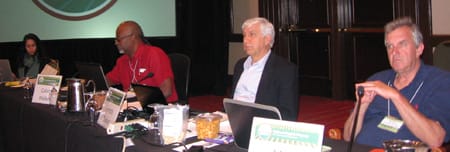
2:13 p.m. PT: Maggie Yount, a personal trainer and citizen lobbyist for Cornucopia, calls for allowing a broader, diverse diet for poultry and outdoors access to address the need for synthethic methionine (methionine is an essential amino acid). Cornucopia supports an expiration date for the use of the material and aggressive research into viable alternatives to the synthetic.
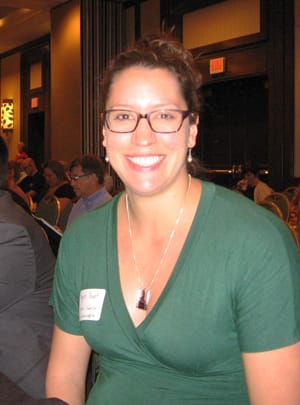 |
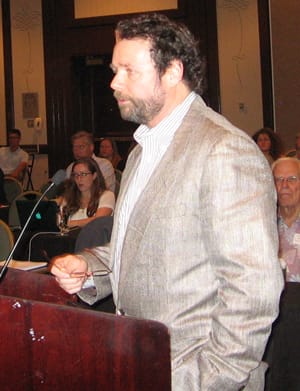 |
2:08 p.m. PT: Cornucopia Codirector Will Fantle tells that NOSB that we are moving from the “age of enforcement” to the “age of litigation” as an antidote to overreach by the USDA into authority and governance of the NOSB. He also calls upon the NOSB to retake control over their agenda and topics they address – a power taken away by the USDA.
12:46 p.m. PT: Faith Attaguile, an urban organic farmer and Cornucopia volunteer lobbyist, expresses her concern about the workload for NOSB members. Expresses support for the relisting of lidocaine for use with livestock.
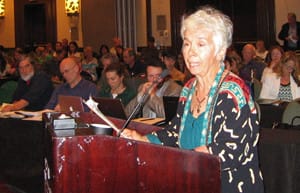 |
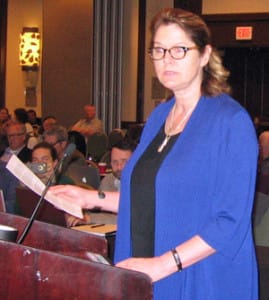 |
12:19 p.m. PT: Elizabeth Wolf of The Cornucopia Institute calls on the NOSB to take a strong stand against nanotechnology. Notes that Cornucopia’s role as a watchdog is critical, and speaking truth to power. Draws parallels to watchdogs of the past that spoke out against use of sewage sludge and irradiation in organics, a fight fought 20 years ago.
11:43 a.m. PT: Mark Squire, a retailer, calls on the NOSB to keep GMOs out of organics, particularly in ingredients and additives – including the processing of the product’s ingredients.
11:35 a.m. PT: Pam Larry, California mom and organic consumer, tells the NOSB that they need to hold the line to keep organic integrity and trust for consumers.
11:34 a.m. PT: Melody Meyer of food distributor UNFI is critical that proactive steps are taken to keep GMOs out of organics. New form of genetic engineering, synthetic biology, must be precluded from organics.
11:22 a.m. PT: Dana Perls of Friends of the Earth tells that board that products made from synthetic biology – including mutagenesis computer generated DNA – are coming onto the market, and the NOSB needs to make a declaration against them. She also says the USDA needs to declare a full prohibition on nanotechnology.
11:07 a.m. PT: Cindy Elder of accredited certifier OCIA tells the NOSB that they have refused to certify hydroponic operations as there are no clear regulations. Hydroponics should not be eligible for organic certification. Also tells the board that the changes to Sunset are wrong.
9:52 a.m. PT: Hain Celestial representative opposes removal of non-organic lecithin (de-oiled) from the national list, as not all their products can use the organic version of lecithin de-oiled.
9:26 a.m. PT: Representative of maker of non-organic lecithin (de-oiled) opposes removal of material from National List. Her company, a subsidiary of DuPont, argues that new sources of the organic lecithin will not meet demand or perform properly. Cornucopia supports removal of this non-organic material from use in organics.
9:22 a.m. PT: Beth Unger of Organic Valley: We can’t use organic celery powder, must keep non-organic on the list.
9:13 a.m. PT: Alexis Randolph of certifier QAI reached out to clients soliciting comments, and did not receive too many comments to explain the necessity to keep materials on the list.
9:08 a.m. PT: Gwendolyn Wyard, OTA: Move seed purity discussion document forward. Organic gylceryin is ready to go, remove synthetic version.
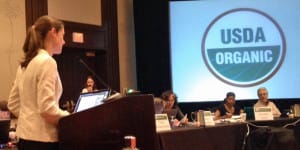 |
8:53 a.m. PT: Charlotte Vallaeys of Consumers Reports/Union: All materials on the National List must be fully reviewed. Reject Whole Algal Flour, as an addition to the list. Only synthetic nutrients required by FDA to be in food should be allowed. Calls on board to differentiate between useful marketing tools (ingredients) and what is essential.
8:47 a.m. PT: First two presenters testify in favor of a new teat dip for infection control in dairy cattle, acidified sodium chlorite. The treatment appears promising. Cornucopia is nuetral at this time on adding it to the National List.
Monday, April 27, 2015
6:37 p.m. PT: Cornucopia states: Past recommendations by the NOSB have not taken into account the impact of chemical intensive agriculture from which colors are derived.
Real possibility that high levels of pesticide residues may exist in concentrated fruit or vegetable extracts, which are used to make natural colors.
5:41 p.m. PT: Cornucopia volunteer Sue Ostling says there are outstanding questions that need to be researched before organic aquaculture standards for land-based systems can be considered. Open-water organic aquaculture systems should be banned.
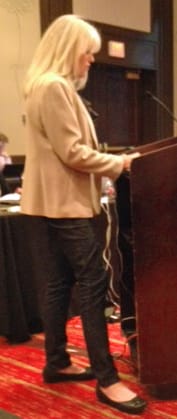 |
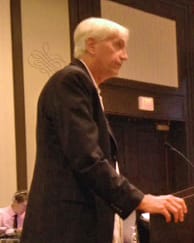 |
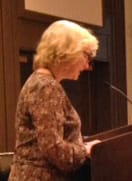 |
5:38 p.m. PT: Keith Schildt for Cornucopia: Peracetic acid is an effective sanitizer with low toxicity and does not leave residues. Cornucopia supports relisting of Peracetic acid.
5:25 p.m. PT: Cheryl Leutjen for Cornucopia: Coated produce should be labeled, and the components of the coating listed.
Only ancillary substances either from organic sources or approved for organic use be allowed in non-synthetic waxes or shellac-based coatings.
5:21 p.m. PT: Cornucopia member Victoria Wexley questions the essentiality of the 2017 sunset material egg white lysozyme.
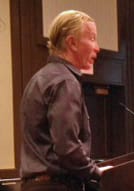 |
5:06 p.m. PT: Dr. James Issacs, a vetrinarian and Cornucopia citizen lobbyist, tells the NOSB that copper and zinc sulfate, should not be allowed, in his personal opinion. Notes that Cornucopia is neutral on the materials.
4:52 p.m. PT: Elyse Batkis, a consumer and Cornucopia citizen lobbyist: Remove L-Malic acid. Bacteriophages need to be separated from the use of microorganisms, they pose unknown health programs.
4:45 p.m. PT: Bill Wolf of Wolf, DiMatteo & Associates, a consulting company for organic operations, says we shouldn’t think in terms of limiting the National List.
4:40 p.m. PT: Jim Gerritsen, Cornucopia policy advisor and OSGATA president states that Integrity demands that there be independence between the NOSB and USDA.
4:23 p.m. PT: Former NOSB board member Jay Feldman testifies that for this meeting, NOSB members need to make sure that all stakeholders are heard. Sunset is important, and sets a high bar for entry into Organic.
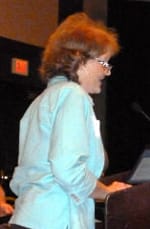 |
4:05 p.m. PT: Commercial fisherman Ann Mossness states openwater aquaculture netpens are incapable of confining fish, disease, and waste.
3:56 p.m. PT: Aimee Simpson, Consumers Union: 71% of consumers want no artificial substances in organics, according to their national polling data.
Requested the NOSB keep legal standards in mind. They don’t mention commercial availability as one of criteria for use of synthetics or artificial substances.
3:38 p.m. PT: Jackie Sleeper of certifier Oregon Tilth expresses concerns about contamination of organic farms by GMO crops and contamination of seedstock.
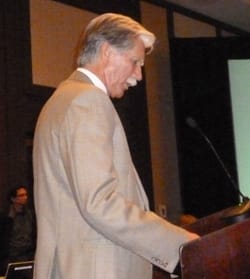 |
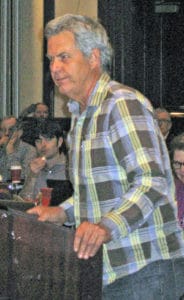 |
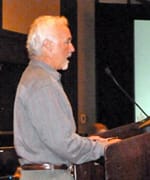 |
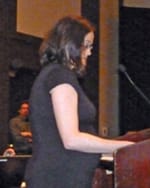 |
3:21 p.m. PT: Judy Frankel, California author, organic consumer and grower of her own fresh veggies:
We live in a soup. Proof of this is the huge deadzone at the end of the Mississippi. Shares her concern that we are not doing a great job of protecting consumers from the creep of synthetic materials into organics.
3:09 p.m. PT: Cornucopia member Dennis Holz questions whether starch coated cotton seed could replace HCl delinted cotton seed for mechanical planting.
3:04 p.m. PT: Steve Sprinkel, former board chair of Cornucopia, organic farmer and organic restaurant owner: We need to listen to the words of Consumers Union and PCC on consumer concerns about organic. I see young farmers that skoff at organic certification. I ran to certification when I was in my 30’s. This is very concerning, these young farmers are on the cutting edge.
2:58 p.m. PT: Cornucopia member Kanta Masters testifies that ferric phosphate is not effective without the use of chelating agents that do not meet OFPA criteria.
2:34 p.m. PT: 5th generation Ventura County, California farmer and Cornucopia member Phil McGrath states copper products are not needed under proper cultural management
2:21 p.m. PT: Jo Ann Baumgartner of the Wild Farm Alliance says to remove copper sulfate from organic agriculture for wildlife health.
2:17 p.m. PT: Abby Youngblood of the National Organic Coalition expresses deep concerns over allowing nanotechnology in organics. Nano materials must be permanently prohibited.
We must also move to abandon synthetic and non-organic materials.
2:04 p.m. PT: Lisa Bunin of the Center for Food Safety recommends the NOSB go back to nanotechnolgy and seek a prohibition in organics.
12:25 p.m. PT: Urvashi Rangen of the Consumers Union: The organic label is out of line with what consumers expect, and has led Consumer’s Union/Reports to downgrade the label. Supportive of lawsuit on Sunset filed by 15 stakeholders (including Cornucopia).
12:20 p.m. PT: Steve Etka of NOC: Close commercial availability loophole created by 606. 606 materials should be reviewed using full OFPA criteria.
12:10 p.m. PT: Terry Shistar comments on hot topics including chlorine materials, copper, fermentation, aquaculture, excipients, and contaminated inputs.
12:05 p.m. PT: Curtis Bennett from Clarkson Soy Products calls on the NOSB to remove conventional lecithin de-oiled from use in organics. Indicates they have developed organic alternatives. This is how the sunset process was intended to work, driving innovation.
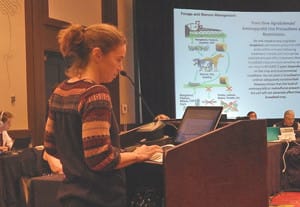 |
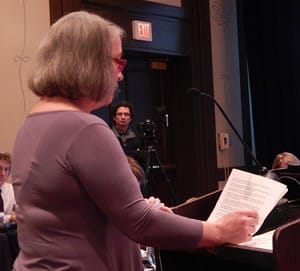 |
11:56 a.m. PT: Cornucopia’s Linley Dixon urges the NOSB to annotate copper materials to specific uses and work with the EPA to ban persistent herbicides.
11:53 a.m. PT: Trudy Bialic, of PCC Natural markets, calls for organic standards to catch up to consumer expectations on animal welfare (not pasturing animals).
Says organic brand may lose consumer trust, consumer attitudes are frequently belittled by some on the board.
When asked a question by NOSB member Calvin Walker on how to improve consumer confidence, says texturizers and animal standard failures have hurt consumer confidence.
11:35 p.m. PT: Organic winemaker Phil LaRocca says he has a hard time finding a source for organic yeast.
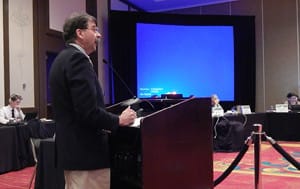 |
11:30 p.m. PT: Cornucopia Codirector Mark Kastel testifies that sunset materials deserve a thorough examination, not a cursory examination. Who owns the organic label. We all do, he says.
11:20 a.m. PT: Comment from Colehour Bondera asks how inerts’ interaction with active ingredients causes more powerful product and how that is evaluated.
11:05 a.m. PT: Representative Clive Davies from EPA shares information on their Safer Choice program.
10:50 a.m. PT: Inerts review has been underway since 2010. EPA has a Safer Choice list that is being explored for inerts work review.
10:46 a.m. PT: NOP staff member Emily Brown Rosen updates on inerts, substances found in allowed pesticides that are not active ingredients. Inerts are known to have their own impacts.
10:14 a.m. PT: NOP staff member Dr. Lisa Brines outlines the 200+ materials and several petitions up for review by the NOSB this year. See Cornucopia comments.
10:04 a.m. PT: Richardson adds that she thinks, in the last year, the relationship between the National Organic Program and NOSB has improved.
9:59 a.m. PT: NOSB chair Jean Richards urging all to seek common ground, notes lawsuits will be decided outside of the process. Calls on Cornucopia to withdraw recent letter calling for new management at NOSB.
9:50 a.m. PT: Plan for an open docket, between meetings for ongoing public input, still on hold.
9:43 a.m. PT: Biodegradable biobased mulch film is allowed if 1) Compostable 2) Biodegradable 3) Biobased
Certifiers must verify that all biomulch is biobased, not synthetic.
9:42 a.m. PT: NOP’s Miles McEvoy says “engineered nanomaterials” are prohibited in organic production…yet recent policy memo allows their use to be petitioned on a case by case basis.
9:33 a.m. PT: An Aquaculture Task Force will be assigned to survey current organic aquaculture production practices and their alignment with OFPA provisions. This task force will report to the NOSB by the Spring of 2016.
9:20 a.m. PT: Miles McEvoy describes the strategic plan that has just been released and is online here.
NOSB Factoid: The budget for the NOSB is $190K. There are four new openings on the NOSB, including two farmer slots. Deadline May 15.
9:13 a.m. PT: Miles McEvoy continues his remarks and indicates that organic aquaculture and pet food standards are expected this summer.
9:11 a.m. PT: The organic animal welfare standards are being readied for release.
9:09 a.m. PT: Miles McEvoy, in his opening remarks at the NOSB meeting, announces that the long awaited origin of livestock rules has been released today.

